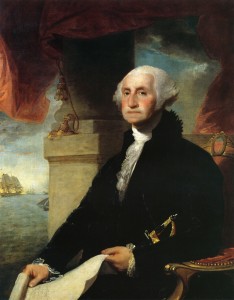George Washington Never Wrote That Jesus Prayer

A lawsuit by the American Humanist Association and four individual plaintiffs resulted in a federal ruling on Tuesday, March 25, that placed a preliminary injunction on the Board of Commissioners of Carroll County, Maryland. The commissioners were ordered to cease opening meetings with prayers that specifically reference Jesus Christ, though they can continue having prayers that don’t invoke “the name of a specific deity associated with any specific faith or belief.” The ruling was issued by Judge William D. Quarles Jr. of the U.S. District Court of Maryland.
But Carroll County Commissioner Robin Bartlett Frazier not only disagreed with this order, she chose to defy it Thursday morning, March 27, by opening a board budget meeting with a Christian prayer that begins, “O Lord our God, most mighty and merciful father, I thine unworthy creature and servant, do once more approach thy presence.” The prayer goes on to declare the supplicant unworthy due to “natural corruptions” and “many sins and transgressions,” and it twice mentions Jesus Christ by name and once as the son of God.
Frazier introduced the prayer as having been authored by George Washington, saying, “This might be a good opportunity to demonstrate how our founding fathers, and leaders all throughout our history, have upheld the idea that we are a nation based on biblical principles. We’re one nation under God and I believe that’s where our unalienable rights come from.”
Apparently aware that she could be charged with contempt of court, Frazier tearfully proclaimed her willingness to go to jail over the issue. But what she seemed unaware of was that George Washington never wrote that prayer.
The words come from a book commonly called “Washington’s Prayer Journal” though its actual title is “The Daily Sacrifice.” The work has been claimed a product of Washington’s youth, up to age 20, which alone might render it irrelevant even if genuine—for it is Washington’s mature adult views on religion that should logically interest us the most.
The original document is handwritten, numbering twenty-four pages in a pocket memo book. Nothing on the item indicates that it belonged to George Washington. But after Lawrence Washington, a descendant, found it in an old trunk in 1890, he gave specialists a chance to look at it. Historian Franklin Steiner would later write in 1936, “Worthington C. Ford, who had handled more of Washington’s manuscripts than any other man except Washington himself, declared that the penmanship was not that of Washington.” Moreover, Washington was notorious as a poor speller, yet the spelling in the prayer book is quite correct.
The document was also submitted to the Smithsonian, where the handwriting was again analyzed, along with other characteristics. The manuscript was rejected once more for not being authentic. Later, Dr. W.A. Croffutt, a Washington D.C. newspaper correspondent, put the final nail in the coffin when he traced some of the prayers back at least to the reign of the English King James I, who died 107 years before George Washington was born.
But none of this mattered to Philadelphia auctioneer Stan V. Henkels, who, in preparing the catalog of sale for an April 1891 auction of Washington family relics, claimed that the item was in George Washington’s own handwriting and that the prayers were of his own composition. From that time on, assorted Christian apologists have argued for the work’s authenticity and it has been published in both facsimile and print form.
The first print edition was by William Herbert Burk in Washington’s Prayers (1907). Then came George Washington the Christian (1919), an apologetic book by William J. Johnson full of additional errors. The prayers fill the second chapter, and this book is still available from devotional publishers as well as in the Internet Archive. The prayer selected by Commissioner Frazier is number 5.
But one who wishes to understand Washington’s religious views is wiser to consult a more recent source, such as The Ways of Providence: Religion and George Washington (2005) by Frank Grizzard Jr., a former senior editor of the George Washington Papers. Regarding the prayer book, Grizzard writes on page 51:
Tens of thousands of genuine Washington manuscripts have survived to the present, including many from the youthful Washington, and even a cursory comparison of the prayer book with a genuine Washington manuscript reveals that they are not the same handwriting. Nevertheless, the prayers continue to be disseminated under Washington’s name . . .
But that’s not all. According to the Carroll County Times, John Fea, history department chair at Messiah College, explained, “[The prayer] is far too pious for Washington. In fact, George Washington only referenced Jesus Christ twice in all his extant writings, and neither of them were in a prayer.”
But even if the prayer delivered by Commissioner Frazier had been genuine, perhaps thereby having some patriotic or historical significance, it wouldn’t have changed the legal picture. A continuous habit of delivering specifically Christian prayers at government meetings creates a hostile environment for non-Christian citizens, be they believers in other religions or nonbelievers. As Monica Miller, an attorney for the American Humanist Association’s Appignani Humanist Legal Center, pointed out, “Non-Christians, who are necessarily excluded by such sectarian Christian prayers, feel like religious outsiders and second-class citizens in their own community.” And there are many more such people today than in Washington’s time.
Therefore it’s long past due for this sort of Christian privileging to end.
